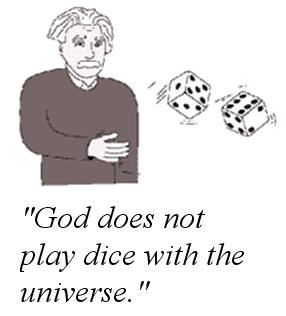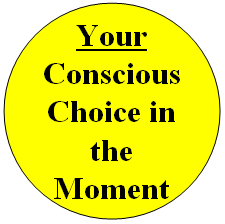

Connections Through Time, Issue 23:
June - December 2004
![]()
|
1.F
Free will is a will free from improper coercion or restraint. Webster's Revised Unabridged Dictionary, © 1996, 1998 MICRA, Inc. |
Free will - "Does it exist?" - is an issue that is invariably raised when precognition is discussed. "How can there be free will if the future can be predicted for random events?"
This question has been discussed
and argued for many millennia, many well respected philosophers and scientists
have taken very different points of view concerning the issue of free will and
the related issue of determinism. Here is a quote from Albert Einstein: Human beings, vegetables, or
cosmic dust, we all dance to a
mysterious tune, intoned in
the distance by an invisible piper.” Einstein probably believed
that the "invisible piper" was the grand unification "theory of everything".
A theory that in principle could predict all physical processes which in turn
could somehow predict all psychological processes of the mind. This
deterministic viewpoint thus holds that predicting the behavior of a person is,
in principle, just as possible as predicting the path of dice thrown apparently
randomly. Both would be considered difficult, but possible, if the initial
conditions were known exactly. It is important to note that even if the
universe were deterministic, free will is still present.
 "Everything
is determined, the
beginning as well as the end, by
forces over which we have no
control. It is determined for the
insect as well as for the star.
"Everything
is determined, the
beginning as well as the end, by
forces over which we have no
control. It is determined for the
insect as well as for the star.
 How can that be, you ask?
Because, the definiti
How can that be, you ask?
Because, the definiti
"If an invisible piper could know what you will do in advance, then you are deluding yourself into believing that you have free will," is the usual response. That response indicates a very different point of view where "deluding yourself" is real. Note that this point of view can be neither proved nor disproved...it is a point of view.
Thus we are left with the important conclusion that determinism and free will are basically points of view. The universe is and is not deterministic. Free will exists and it does not exist. Don't these statements remind you of the mysterious logic of entanglement in quantum mechanics...a mysterious logic that permits "qubits" in quantum computers to have values of 1 and not 1 at the same time.
It appears that the intellect can not always answer what seem to be reasonable questions or issues. This is known in the field of mathematics as
Gödel's Incompleteness Theorem. In 1931, Kurt Gödel proved the now-famous theorem. He showed that within any given mathematical structure (axioms, procedures, etc), there would always be some propositions that couldn't be proven either true or false within that mathematical structure itself. (Some true propositions could be proven by moving to a broader mathematical structure; for example, moving from the structure of integers to the broader structure of real numbers.)We believe that propositions/issues/questions concerning determinism and free will fall in the category of propositions that cannot be proven either true or false within our current worldview. Some important questions can, fortunately, be answered. In particular, the question concerning the reality of precognition can be scientifically examined using statistics. Dr. Jessica Utts, Division of Statistics, at the University of California, Davis, wrote a paper entitled, An Assessment of the Evidence for Psychic Functioning. In her abstract she says,
"Precognition, in which the answer is known to no one until a future time, appears to work quite well. Recent experiments suggest that if there is a psychic sense then it works much like our other five senses, by detecting change. Given that physicists are currently grappling with an understanding of time, it may be that a psychic sense exists that scans the future for major change, much as our eyes scan the environment for visual change or our ears allow us to respond to sudden changes in sound. It is recommended that future experiments focus on understanding how this phenomenon works, and on how to make it as useful as possible. There is little benefit to continuing experiments designed to offer proof, since there is little more to be offered to anyone who does not accept the current collection of data."
References
Free Will and Precognition Remote viewers discuss free will and conduct an experiment.
The paper by Professor Utts is from the Journal of Scientific Exploration,, Volume 10, Number 1, Spring 1996.
Go to another section of this
issue:
Physics: